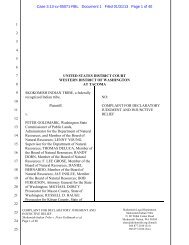Appellant Brief - Turtle Talk
Appellant Brief - Turtle Talk
Appellant Brief - Turtle Talk
Create successful ePaper yourself
Turn your PDF publications into a flip-book with our unique Google optimized e-Paper software.
nature of such a “right-of-way” would be defined by the instrument creating it.<br />
Restatement (Third) of Property: Servitudes § 4.1; see Scherger v. N. Natural Gas<br />
Co., 575 N.W.2d 578, 580 (Minn. 1998) (“The extent of an easement depends<br />
entirely upon the construction of the terms of the agreement granting the<br />
easement.”). In creating a right-of-way, a landowner has the right to convey as<br />
much or as little as he desires. The holder of the right-of-way has no right to<br />
demand more than was conveyed. See, e.g., Hwy. 7 Embers, Inc. v. NW Nat’l<br />
Bank, 256 N.W.2d 271 (Minn. 1977) (limiting parties to express terms of<br />
easement).<br />
But under the District Court’s interpretation, even an absolutely clear and<br />
express reservation of tribal jurisdiction apparently would be declared a nullity. A<br />
categorical reading of Strate deprives tribes of this most basic right—the right of a<br />
landowner to convey certain aspects of his bundle of rights while retaining others.<br />
Treating sovereign Indian tribes as less than private property owners is both unjust<br />
and wholly inconsistent with tribes’ governmental status and Congress’ policy of<br />
promoting tribal government.<br />
D. Categorical Application of the Supreme Court’s Decision in Strate<br />
Would Impair Productive Government-to-Government<br />
Negotiations Between Tribes and States.<br />
Under the District Court’s reading of Strate, an Indian tribe would have to<br />
be willing to give up its sovereign regulatory and adjudicatory authority to regulate<br />
22

















